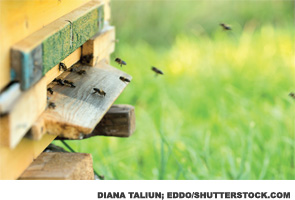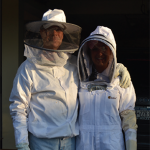
I have been thinking a lot about bees lately.
About a year ago, my wife had the idea that we should keep bees, because the lavender in our garden would be a good source for honey. Always being up for a new challenge, I attended a meeting for aspiring beekeepers and quickly became fascinated by the world of bees.
About Bees
The hobby is called “beekeeping” rather than “bee farming” or “honey farming” because the bees are quite capable of taking care of everything on their own, with no help from humans. The goal of the beekeeper is generally to enhance honey production so the bees have more than they need, so we can have some for ourselves.
Bees are fantastically organized, and they are born knowing what to do. It all begins with the queen—only one per colony—whose job it is to lay eggs, up to 1,500 a day for a really productive queen. The nurse bees then feed the developing egg bee bread, brood food and royal jelly (three days for a worker, and five days for a burgeoning queen). By Day 3, it’s a larva (looks like what a layperson would call a “maggot”), and then after another five or six days, it’s sealed into its cell for about 12 days while it undergoes what we called in elementary school metamorphosis. At that point, it chews its way out of the cell and is now officially a bee.
The queen has more to do than lay eggs. She secretes pheromones, olfactory signals somewhat akin to the cytokines that cells use to communicate with one another. These pheromones control the behavior of the worker bees. The absence of a certain pheromone tells the workers that they need to raise a new queen. A pheromone can also trigger the colony to swarm: The queen and half the colony leave a crowded hive to find a bigger home.
What is particularly amazing is that there is an orderly progression of bee duties that develops. The newest bees are charged with cleaning out the cells so the queen can lay more eggs and develop more brood, and then graduate to other duties requiring more experience. Examples: tending to the queen, making wax to build comb, packing pollen, guarding the entrance to the hive, ventilating the hive and taking out the trash. Only the most experienced bees get to graduate to the most exciting (and dangerous) duty, which is to venture forth from the hive to gather pollen and nectar.
What if doctors, hospitals, insurance companies & patients all worked together toward the idea that it is in everyone’s mutual interest that we all stay healthy?
Bees make honey so they can live through the winter, not for our gustatory pleasure. Honey is basically plant nectar that has been processed with bee saliva, stored in a cell and then dehydrated to a water content of 18% or less. The bees accomplish this by fanning their wings furiously to evaporate the water. Honey does not ferment due to this low water concentration. Somehow the bees know how to get it right, and then seal the honey cell with wax when it is just right.
It’s quite thought-provoking that the bees that set aside the honey for the winter are not going to be around to eat it: The life span of a honeybee (other than the queen) in the summer is only four to six weeks. This means that the bees working so hard to collect the pollen and nectar are not going to be around to dine on it during the winter. During the “nectar flow” in the spring and summer, they are frantically collecting pollen and nectar so the bees that come after them will survive the winter. The winter bees just have to hang around and eat honey, so they live for several months. If they don’t run out of food or freeze to death, they’ve got it made. Some call them “welfare bees” (not intended to be a political statement by the author).
The brain of a honeybee is about the size a sesame seed, so it does not seem likely that such concepts as altruism, self-sacrifice and hope for the future motivate them. Rather, I suppose this is all innate or instinctual. Their mental apparatus is not complex enough to pursue a degree, start a business, produce a work of art or, on the other hand, cheat on taxes, commit adultery or all sorts of other advanced human behaviors.
What If …
Watching bees is fascinating. Sometimes I ponder what the healthcare system would be like if we were bees. Everyone would have a very clear role, and everyone would be working together for a common goal, which is the health and survival of the colony. Otherwise, the colony does not survive through the winter.
Sure, it’s a fantasy, but what if doctors, hospitals, insurance companies and patients all worked together toward the idea that it is in everyone’s mutual interest that we all stay healthy? Indulge me for a moment; I know this is impossible, that it is not human nature, that we are considering a utopian concept. We pride ourselves on having a highly sophisticated medical system that keeps people living longer and healthier, and developing better medications and devices. But the cost is unsustainable, and the distribution of care inadequate.
If we were a bee colony, we would have to work together so the colony would be healthy and survive and not run out of honey before the next nectar flow in the spring. This is not an argument for universal healthcare or individual responsibility so much as it is a reflection on our lack of success in putting together an efficient healthcare system that gets the job done for everyone at a cost we can all afford. It seems like a logical idea, but between the free market and “government-run” healthcare, I cannot say that we are accomplishing that goal.
The Ideal
I know it’s naive and idealistic to propose that doctors, patients, insurers and regulators work together toward a common goal. It’s not going to happen, but you have to admit it would be a pretty good idea.
Rick Brasington, MD, is a rheumatologist and fellowship program director at Washington University in St. Louis, and an associate editor of The Rheumatologist.

